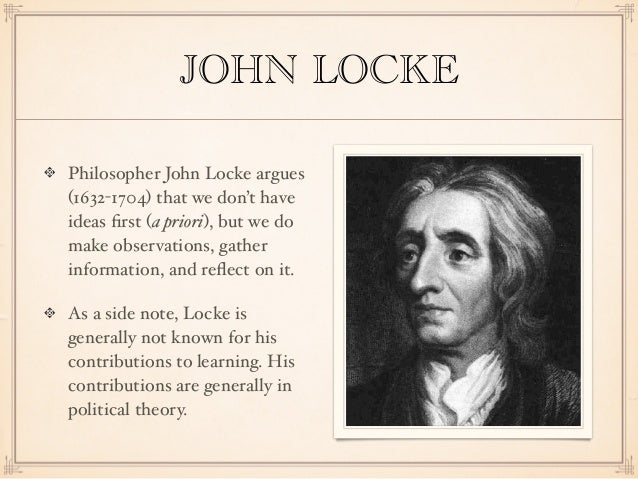This is where the three estates of the French pre-revolution hierarchy come from. To fully comprehend his work on the social contract it is important to recognise that he aims to construct a liberal framework centred upon limited government individual rights and government by consent.
In this essay Locke outlines how he believes human knowledge is derived.

Beliefs of john locke. John also believed people had the right to act the way they want to a certain extent. He would influence George Berkley and David Hume and a modification of social contract theory that would lay the foundation of the ideas of liberal democracy and classical republicanism. British political theorist and philosopher John Locke is known for his belief in a system of limited government in which natural rights are the basis for a social contract existing between the governed and their government.
The most lasting contribution offered by Locke towards the field of political theory is that of the social contract. Locke believed that there is a distinct and inseparable connection between religion and morality. Who Was John Locke.
Human knowledge is derived from outer experience and reflection which. John Locke believed that if society was divied up into three compartments with their own responsibilities and their own amount of power that society will function better. John Locke was a 17th-century British philosopher who contributed both to modern political discourse and the foundations of empiricism.
The English philosopher and political theorist John Locke 1632-1704 laid much of the groundwork for the Enlightenment and made central contributions to the development of liberalism. All human thoughts and ideas must therefore be derived from direct sensory perception or through internal contemplation. We begin with a tabula rosa blank sheet.
A parallel can be drawn between the United States Constitutions concept of the general welfare and Rousseaus concept of the general. John Darlings 1994 book Child-Centered Education and its Critics portrays the. The latter leads Locke to maintain that there.
They shared beliefs regarding the self-evidence that all men are created equal and the conviction that citizens of a republic be educated at public expense. John Locke went to Westminster School and then Christ. In Book IV of An Essay Concerning Human Understanding 1689 Locke defined knowledge as the perception of the connexion of and agreement or disagreement and repugnancy of any of our ideas Knowledge so defined admits of three degrees according to Locke.
He espoused the natural rights of man namely the right to life liberty and property and he articulated that every governments purpose is to secure these rights for its nationals. According to Locke we have no such thing as intuitive ideas about right and wrong God etc. Strathern explains Lockes philosophy on human knowledge as beginning with a blank sheet.
Because of the inherently unstable state of nature Locke believed that people relinquish certain rights in exchange for an. He reckons that human beings should as a general rule enjoy freedom of the understanding and that the state has a duty to respect freedom of the understanding on matters of religion Black 473. What were John Lockes ideasbeliefs Equality meaning that no man meeting citizenship qualifications was entitled to greater privileges than another man by.
Locke believed that everyone was of a positive nature and believed everyone was essentially fair and unselfish. Locke sets out to demonstrate that human beings are not born with innate ideas or beliefs but rather that they come into the world as a blank sheet the Latin phrase tabula rasa is often used to represent this idea. Life meaning people have the right to live Liberty which basically meant freedom Property which meant everyone had the right to own land.
Political philosopher and social psychologist John Locke was an outspoken supporter of equal rights within a governed society. English philosopher John Lockes works lie at the foundation of modern philosophical empiricism and political liberalism.
